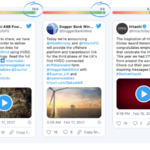Many sales and marketing professionals use Google Alerts for monitoring competitors. Knowing when competitors are mentioned in the news and why they’re being mentioned can be crucial. They could be announcing a new expansion, an acquisition, or major layoffs – any of these stories can impact your own business.
One of the perks of Google Alerts is its simplicity. Essentially you can do a Google News search for your competitor, click on the option to create an alert. You’ll automatically receive an email every morning with the news results of that competitor. Sounds simple enough, right?
While simplicity is nice, there can be drawbacks. Many times Google News results are full of reports, real estate listings, obituaries, and stories. Usually it’s not an exact match to what you’re searching for and wanting to keep track of. Then you waste a lot of time sifting through the email to find the stories that you really care about. For instance, keeping tabs on composite decking competitors can result in you getting alerts about T-rexes.
Customization
Google Alerts also doesn’t offer much in terms of customization. You create alerts on one search and you can’t combine multiple searches into a single alert. So if you have several competitors, you’ll have to set up alerts for each competitor. You also need to set up separate alerts if your competitors have different names, a parent company, or an acronym. This can really start to fill up your inbox. You also can’t have the alert sent to more than one email address. So along with trying to identify the actual news stories, you also have to go through emails for each competitor (or several emails for each competitor) and then forward on the stories to others on your team.
Missing Articles
Another drawback of Google Alerts is that it doesn’t always catch everything. Google picks up if your competitor is in The Wall Street Journal or The New York Times. If your competitor closes down a factory in Duluth, MN and only the Duluth News Tribune writes about it, Google may not capture it.
Multiple Emails
Also, Google Alerts is an email-only tool. There’s not an easy way to combine all of your emails and news stories into a single source. Also, if you accidentally delete your email, your only hope is being able to recover it from your trash. There isn’t a way to access an archive of old alerts and stories.
News Only
The last drawback of Google Alerts I want to talk about is that Google Alerts only captures news articles. Granted, this is exactly what Google Alerts is for, but there’s a lot more to competitor monitoring than just news stories. If you want to track your competitors’ self-published content – such as their blog posts or their press releases (that may not get picked up by news outlets) then you have to manually check their websites for new content. Or if you’re wanting to keep track of their social media content, you’re going to have to use another tool. Most social media monitoring tools aren’t free either.
When it comes to monitoring your competitors digital presence, you’re going to get exactly what you pay for. There are free tools out there, like Google Alerts.You can combine those with other tools for a robust tracking system. Checking multiple tools and weeding out the good from the bad takes time. In today’s busy and ever-changing world, time is extremely valuable.
Looking for an Alternative?
If you’re using Google Alerts to track industry and competitor news, but you’re tired of sifting through all the clutter, there are other options. All of us at Signal Insights, wished we had a tool like ours in previous roles (which is one of the reasons we built it). When looking at all the solutions out there, it was hard to find one that tracked everything we needed, was easy to consume, and affordable.
We built Signal Insights to help sales and marketing teams keep track of their competitors quickly and effectively. News stories are pulled from multiple sources (not just one). Machine learning filters out the spam and garbage that you don’t care about. It also pulls in social media updates, their e-mails, and blog posts. Many companies will make announcements on their website’s newsroom – such as big hires and mergers/acquisitions – before they ever post it on social media and sometimes it never hits a news story. Lastly, we can pull in all the industry news sites you read so that you have one dashboard to view when you login to your computer every morning, versus dozens of emails or bookmarked sites.
Our customizable email alerts can also save you more time. All of your competitor news, blog posts, top social posts, emails, and industry news is consolidated into a single email that’s easy to consume on any device and can be scheduled daily, weekly or every-other week. We can also send it to everyone on your team eliminating the need of creating email filters and forwarding.


